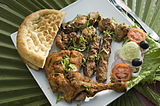Kheer
hideThis article has multiple issues. Please help or discuss these issues on the talk page. (Learn how and when to remove these template messages)
|
 A bowl of kheer | |
| Alternative names | Payasam, Payesh and Ksheeram |
|---|---|
| Place of origin | Indian Subcontinent |
| Region or state | India, Pakistan, Bangladesh, Sri Lanka, Bhutan, Nepal |
| Main ingredients | Rice, milk, sugar, cardamom, jaggery, saffron, pistachios or almonds |
| Variations | Barley kheer, Kaddu ki kheer, paal (milk), payasam, payesh, chhanar payesh (payesh made with chhana or paneer) |
Food energy (per serving) | 249 kcal kcal |
Kheer or Kheeri or Payesh, Payasam or Phirni (Hindi: खीर; Bengali: পায়েস; Odia: କ୍ଷୀରି; Sinhala: පායාසම්; Kannada: ಪಾಯಸ; Tamil: பாயசம்; Malayalam : പായസം, Nepali: खिर; Telugu: పాయసం; Punjabi: ਖੀਰ; Urdu: کھیر ) is a sweet dish and a type of wet pudding popular in the Indian subcontinent, usually made by boiling milk, sugar or jaggery, and rice, although rice may be substituted with one of the following: daals, bulgur wheat, millet, tapioca, vermicelli, or sweet corn. It is typically flavoured with desiccated coconut, cardamom, raisins, saffron, cashews, pistachios, almonds, or other dry fruits and nuts, and recently pseudograins are also gaining popularity. It is typically served as part of a multicourse meal, as a dessert.[citation needed]
Etymology[]
The word kheer is derived from the Sanskrit word for milk, ksheer (क्षीर). Ksheer is also the archaic name for sweet rice pudding.
Origin[]

Kheer was a part of the ancient Indian diet and is mentioned in the Ayurveda.[1][better source needed]
According to the food historian K. T. Achaya, kheer or payas, as it is known in southern India, was a popular dish in ancient India. First mentioned in ancient Indian literature, it was a mixture of rice, milk and sugar, a formula that has endured for over two thousand years. Payas was also a staple Hindu temple food, in particular, and it is served as Prasāda to devotees.[2]
See also[]
- Porridge
- Khira sagara
References[]
- ^ "Kheer: The Quintessential Indian Milk Affair". Retrieved 21 April 2020.
- ^ "A truly international dessert". Hindustan Times. 3 October 2009.
- Bangladeshi rice dishes
- Indian rice dishes
- North Indian cuisine
- Bihari cuisine
- Uttar Pradeshi cuisine
- Indian desserts
- Nepalese cuisine
- Bangladeshi desserts
- Odia cuisine
- Rice pudding
- Telangana cuisine
- Hyderabadi cuisine
- Punjabi cuisine
- Kerala cuisine
- Tamil cuisine
- Indian cuisine
- Pakistani cuisine
- Sri Lankan cuisine



